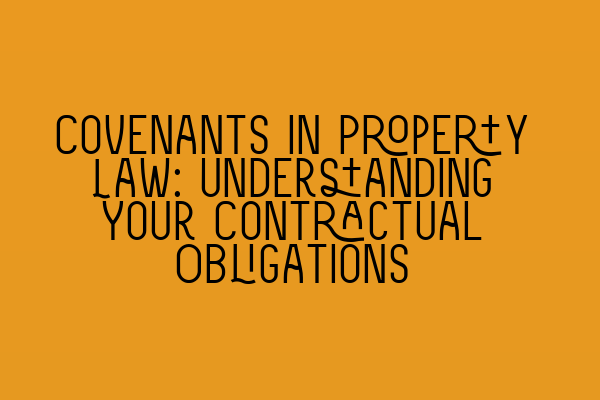Covenants in Property Law: Understanding Your Contractual Obligations
When it comes to property law, understanding your contractual obligations is crucial. One essential aspect of property contracts is the inclusion of covenants. In this article, we will explore what covenants are, why they are important, and how they can impact your rights and responsibilities as a property owner.
What are Covenants?
In property law, a covenant is a promise or agreement contained within a contract that outlines certain obligations or restrictions imposed on the parties involved. These covenants are legally binding and enforceable by law. They help maintain order, protect property values, and ensure that everyone involved in the transaction is aware of their rights and responsibilities.
Types of Covenants
There are two main types of covenants: positive covenants and restrictive covenants.
Positive Covenants
Positive covenants require the party involved to actively perform certain actions or obligations. These covenants often relate to the maintenance and upkeep of the property, such as keeping the premises clean, mowing the lawn regularly, or repairing any damages promptly. They are intended to ensure the property’s proper condition and prevent any deterioration.
Restrictive Covenants
On the other hand, restrictive covenants impose limitations or restrictions on how the property can be used or developed. These covenants aim to maintain a certain standard or protect the interests of all parties involved. For example, a restrictive covenant may prevent the property owner from using the property for commercial purposes or from making significant renovations without obtaining prior consent.
Enforceability of Covenants
Covenants are legally binding and enforceable, but their enforceability depends on various factors. In general, for a covenant to be enforceable, it must:
- Be in writing
- Be signed by the involved parties
- Contain clear and specific terms
- Be intended to run with the land
It’s important to note that covenants can also be enforced by neighboring property owners, homeowners’ associations, or other parties with an interest in maintaining the integrity and value of the surrounding properties.
Consequences of Breaching Covenants
If a party breaches a covenant, there can be legal consequences. The injured party may take legal action to seek remedies, such as damages or an injunction, to enforce the covenant or compensate for any losses suffered. It is essential to understand the potential consequences of breaching a covenant before entering into a property contract to avoid any legal disputes or financial repercussions.
Examples of Covenants
Here are a few examples of covenants that you may encounter:
- A covenant requiring the property owner to maintain an adequate insurance policy for the property
- A covenant restricting the property owner from building any structures taller than two stories
- A covenant prohibiting the property owner from operating a business from the premises
- A covenant mandating the property owner to pay regular maintenance fees for shared community spaces
- A covenant requiring the property owner to obtain permission from the homeowners’ association before making any exterior changes to the property
The Importance of Understanding Covenants
Understanding the covenants included in your property contract is crucial for several reasons:
- Compliance: By understanding your contractual obligations, you can ensure that you comply with all the terms and conditions outlined in the covenant.
- Legal Protection: Understanding covenants can help you protect your rights and avoid potential legal disputes. By knowing your obligations and restrictions, you can act accordingly and prevent any breach.
- Property Value: Some covenants are designed to maintain property values by preventing certain activities or maintaining a standard. Understanding these covenants can help you preserve the value of your property and the surrounding properties.
Seeking Legal Advice
When entering into a property contract, it is always advisable to seek legal advice to ensure that you fully understand the covenants and their implications. A qualified property law solicitor can guide you through the process, review the contract, and help you make informed decisions.
If you have questions about covenants, property law, or any other legal matter, SQE Property Law & Land Law is here to help. Contact us today to speak with one of our experienced solicitors.
Related Articles:
